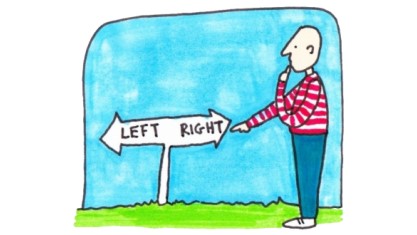
Home > Latest Thinking » How common sense can lead coaches on the wrong path
Regressing to be mean: How coaches commonsense can be dangerous
One of the best way for people who work by telephone to improve their skills is to get into small groups with each other and listen back to their calls along with a coach. I have been helping people in different companies do this for over ten years. To do this I go and find call recordings and play extracts back to the group in carefully controlled conditions for discussion. When I am preparing the session, I need to choose what to play back, I can pick the broken conversations with the bad bits so that I can correct them in the discussion, or I can pick the particularly good bits to single out for praise and emulation. So how do I choose?
Look: I know about the research on feedback. It seems pretty clear in its position that positive feedback produces better results over the longer term than negative feedback. Aubrey Daniels in his book “Bringing out the best in people” gave a 4:1 positive to negative ratio, Fredrickson in her paper Updated thinking on Positivity Ratio’s” suggests 3:1. In Kulger and DeNisi’s 1998 paper “The effects of feedback interventions on performance”, they suggested to stay on task – stay away from conversations that make people introspective as they will likely stop hearing your message – another good reason to stay positive.
So why? I thought, do I feel as a coach I am getting somewhere when I coach negative and feel that I’m not getting through when I coach positive? In fact I felt this so much that without a deliberate focus on my part to focus on positive interventions, common sense would tell me to coach to the negative and I would predominantly choose those kinds of calls.
So I went back and looked at previous projects and my project diaries. Sure enough, I noticed over the years that when I succumbed to my instinct and coached more negatively I felt better about the work I was doing during the project, but I got worse outcomes at the end of the project.
It wasn’t until I reread Daniel Kahneman’s book “Thinking Fast and Slow” that the penny dropped. The reason I liked giving negative feedback better is because most of the time when I listened to the next call on the topic after giving negative feedback there was improvement, whereas mostly when I listened to a call subsequent to one on which I had given positive feedback, it got worse. So it felt obvious, coaching to the negative got better results! But here is what I had missed. When I picked out the bad call, it was by definition significantly worse than average, that’s why I had picked it!. Regardless of the coaching, the next call would likely be more average than this exceptionally bad call, and therefore better. For a good call it was the opposite, we might have a great conversation on why it worked, but it was a particularly good call! so by the law of averages the next call was nearly always worse.
This random fluctuation in call quality was having a strange effect on me as a coach. It was causing me to be mean. My rational experience was teaching me over the short term to do exactly the wrong thing! This variation around the average in call quality is called “regression to the mean”. The effects it can have on what is commonsense in a community of coaches can have a significant negative impact on any behaviour change project and can make the difference between a solid and sustainable training success and a failed project
My suggestion to coaches from this article is to challenge your sense about what is a good coaching session – just because it felt good as a coach, doesn’t mean it was valuable or even that it created a positive change. Trust the 3:1 positive to negative ratio and track your own ratio. If you are a designer (or procurer) of coaching programmes, ensure you have an environment that nudges your coaches to make the right choices in their choice of feedback interventions. Also, find a way to measure behaviour change over the medium term, 4 to 6 weeks, benchmark early, watch your coaches instincts and coach to the positive.

